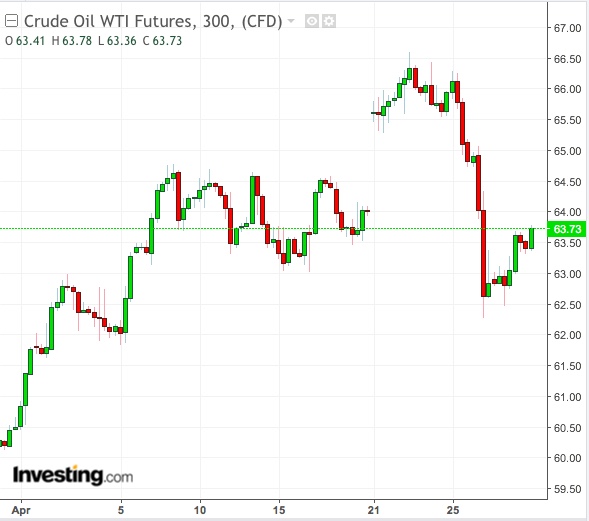The popular belief was that oil prices would go spiraling out of control with the announcement, hitting one high after another.

Well, crude did smash key resistance—$65 for U.S. West Texas Intermediate and $75 for U.K. Brent. But its subsequent retreat, particularly the manner in which that was forced, has become as memorable as the events that led to the market’s surge.
One week after U.S. President Donald Trump’s shock decision not to renew sanction waivers for buyers of Iranian oil, the bulls aren’t celebrating as they should be.
After basking for barely a week at near six-month highs, oil prices fell unceremoniously by as much as 3% on Friday, and have struggled to rise since. The culprit? The same Trump, who, after sending Saudi Arabia into bouts of glee by landing the ultimate body blow on its OPEC archrival, was back to pressuring Riyadh to raise output to make up for barrels hypothetically lost from Iran.
No Easy Payday For Bulls
Beyond Trump’s conflicting market maneuvers, which may seem as diabolical to oil bulls as the “evil” of Tehran that he regularly rails against, there’s reason to believe that the enhanced sanctions on Iran alone, beginning after midnight May 1, won’t result in a easy payday for those long the market.
One argument for that is the ingenuity and stealth deployed by the Iranians to get their oil out to the world beyond levels permitted by the Trump administration during last year’s sanction waivers—and even when they weren’t allowed to export any. These include turning off the transponders on the tankers carrying Iranian crude to ensure they remain “dark” to tracking services till their destination, and preemptively stopping the use of the U.S. dollar in oil trades to further reduce detection.
Now, with China openly defying the U.S. in suggesting it will continue taking at least some Iranian oil (about half of Tehran’s 1.1 million barrels per day has been going to them), and with Trump rumored to be considering a special exemption for Beijing despite what Iran hawks in his administration say, the outlook for crude prices couldn’t be muddier.
So, what can Iran do to the best-laid plans of oil bulls?
Like in any good debate, there are opposing theories, and here are a few from two leading consultancies in the market, New York-based Energy Intelligence and London-based Energy Aspects.
Lower-For-Longer Exports From Tehran?
Energy Intelligence thinks Iran’s exports will fall to around 500,000 bpd, or 55% below last year, as regular buyers like China, Turkey and India shrink away on fear of being targeted by Washington despite their complaints about U.S. unilateralism in the matter.
Energy Intelligence also argues that there’ll be enough OPEC producers, Saudi Arabia included, to step up to the plate to provide what Iran can’t, although those barrels could come at much higher prices, essentially supporting the oil rally.
It noted that while Beijing remained vocal in demanding exemptions to the sanctions, there was no certainty that even two tankers of Iranian crude scheduled for arrival in China in early May would make the landing, as their tracking equipment had been turned off for over a week.
The New York-based consultancy said:
“Washington’s newfound aggressiveness means the market will need to adapt to lower-for-longer Iranian exports."
“Nobody will die to help the Iranians,” it added, quoting a trader it did not identify.
Will China Get The Exemption It Wants?
Energy Aspects, meanwhile, has a more generous estimate of 600,000 bpd for Iranian exports from May/June onward.
That does not account for another 100,000 to 200,000 bpd of crude that Tehran will be able to smuggle out, including the around 50,000 bpd that Iran was already supplying the Assad regime in Syria.
More than anything else, the London-based consultancy is betting on Iran’s wily ways to achieve this.
Energy Aspects adds:
“Iran can continue cheating through various mechanisms, including ship-to-ship (STS) transfers, faking documents to obscure the origins of cargoes and switching off ship transponders. Iran has plenty of experience and incentive to sneak out as much oil as possible, but there are practical limits—smuggling of oil products is common, aided by the smaller cargo sizes, but getting large volumes of crude to buyers undetected would be much harder.”
“Some buyers may opt to continue buying from Iran, either believing they can conceal the transactions or because they have minimal exposure to the U.S. making penalties less of a concern. The extent of cheating will partly depend on U.S. sanctions enforcement. If U.S. officials are proactive, perhaps announcing some high-profile designations early on, deterrence will be strengthened. But right now, it remains unclear whether the U.S. government is willing to designate high-profile companies if they breach sanctions.”
The London-based consultancy says Chinese refiners could draw on the roughly 30 million barrels of Iranian oil sitting in bonded storage tanks in China. But it also notes that Beijing might want to avoid a diplomatic flap with Washington amid their ongoing trade talks.
If China indeed wins an Iranian reprieve from the U.S., Energy Aspects expects the buying to go through Zhuhai Zhenrong, a trader with limited exposure to the U.S.. and via banks that are similarly insulated.
Energy Aspects estimates that Zhuhai has a term contract for 240,000 bpd and could be granted an additional 30,000 to 40,000 bpd if designated again by the U.S., as it was in 2012 by the Obama administration.
The consultancy added: “In many ways, this could be a face-saving outcome for both the U.S. and China.”
John Kilduff, partner at New York energy hedge fund Again Capital, says over the longer haul, Iran will be hoping to play it out till the U.S. 2020 election, in the hope that a more amenable president will come to power—though there’s no certainty of that. He adds: “The Iranians will survive this. They are one of the world’s most hardened regimes.”
